Tips for Mouse Season: How to Prevent Infestation
Every winter, we bundle up in warm clothes and spend more time indoors. Mice do the same, often seeking shelter inside our property! Luckily, there are plenty of tips and ideas to prevent mice from entering a house. You can enjoy holiday cheer without worrying about pests or rodents.
Mice reproduce at an alarming rate; a litter of five or more every two months. It’s no surprise that a region as populated as the GTA also has a high population of rodents. Although infestations happen year-round, it’s in the winter that we start to scramble for solutions. How do I prevent them from getting in? Should I use mousetraps? Should I get a cat? The answers to these questions depend on each unique situation, which is why it’s usually best to hire a professional pest control company for assistance.
Mice Like Being Warm and Toasty, Too
Canadian winters are some of the coldest in the world. Animals endemic to the area know to find shelter during these months. Unfortunately, in urban areas like Toronto, city mice know it’s easier to build a nest in the walls of a house than elsewhere. Mice don’t like extreme temperatures; cold winters and hot summers are both problematic. It’s best to nip this problem in the bud; the best offense is a strong defense.
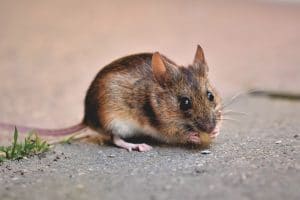
The Effects of a Mouse Infestation
Despite their cute and furry faces, these little creatures can cause damage to your house. Mice have the natural inclination to chew and rip materials apart. Their nests are often made from garbage, ripped up drywall, paper, and boxes. They might bring these materials in from outside or steal them from your home. It’s also common for them to chew holes through the drywall to access food sources.
Other materials mice love to chew on are insulation and wires. Insulation makes an ideal addition to their nests. Unfortunately, a missing piece of your insulation means cold air is getting in and heat is escaping. Also, chewed wires create a major fire hazard. Some mice will build their nest inside large appliances, like the backs of ovens or the refrigerator. Unfortunately, when they chew the wires in these areas, they can cause the appliance to short-circuit and a fire to erupt.

Mice chew on cords, causing a fire hazard.
The last way mice can damage your house is by defecating. It’s not nice to think about, but mice urinate and defecate constantly. They leave a trail of urine behind them to be able to find their way around easier. Some mice can defecate up to one gram per day. Both of these substances can cause you and your family to develop Hantavirus Pulmonary Syndrome.
Signs You Have a Mouse Infestation
Now that you know how problematic mouse infestations can be, it’s time to learn the signs you might have one. Here are the most common hints there’s a problem afoot:
- Droppings and urine trails
- Chew marks on furniture, wires, and fabric
- Musky, rodent smell
- Crumbled drywall
Mice are nocturnal creatures. You might hear them running around during the night. It could sound like tiny feet pitter-pattering on your floors, counters, and on other surfaces. They also squeak to communicate.
Check your food storage containers for evidence of mice. Since these critters will chew through anything, check your cereal boxes and pasta bags for holes. If you do notice food containers have been invaded, throw them out immediately.
For effective solutions, read the following tips on preventing mouse infestations:
Tips for Preventing Mouse Invasions
Depending on the size of your infestation, there are a handful of things you can do to halt it. These tips are also great for preventing future violations.
Seal Cracks and Holes
Mice can fit through holes as small as 7mm. If they need more space to get through a hole, they’ll chew around it to make it bigger. It’s crucial to seal all openings and cracks to remove their opportunity to get in.
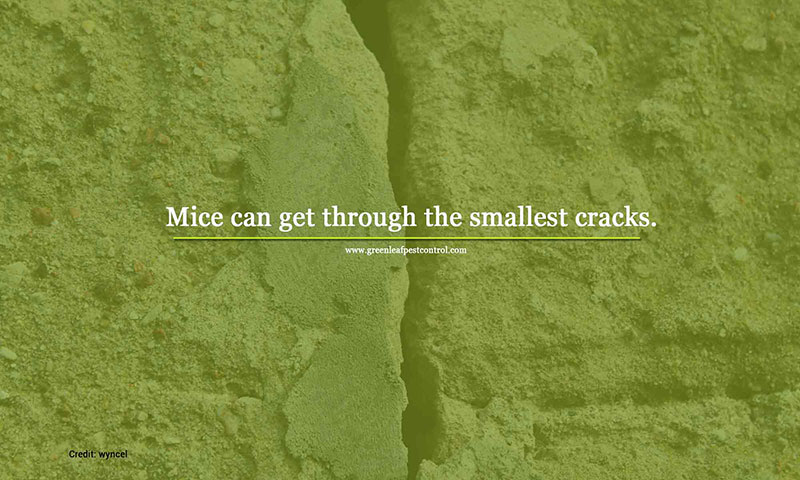
Do an assessment of the outside of your home. Look for holes, gaps, and cracks that are creating a potential mouse (or insect) highway. Fill them with the proper materials for the location. You can also consult a professional commercial pest control company to help with this task.
1. Store Food in Chew-Proof Containers
It’s time to toss away the cardboard boxes and plastic bags you may have traditionally used to store food. Transfer all food items into stainless steel or ceramic containers so mice can’t chew through them. It’s best not to keep food containers on the counter or in cabinets that are open. Another huge tip is to use large outdoor garbage bins with lids. Our refuse and organic matter is like an all-you-can-eat buffet for mice. Use a sealed and chew-proof bin for your garbage. The same goes for your compost container. Either switch to a chew-proof bin or store your compost in the freezer.

2. Maintain a Clean House
Keeping your house clean and crumb-free can help reduce the likelihood of a mouse infestation. Crumbs are excellent sources of food for small rodents. To prevent mice from dining on your kitchen floor, take extra precautions. You likely already have a clean and hygienic house; taking a little more time to tidy up makes all the difference.
After you’re done cooking for the day, do a full sweep of kitchen floors. Sweep the eating areas, too. Get in the habit of moving furniture and appliances away from the wall and collect fallen food. The places we forget to clean often collect crumbs and dust. Occasionally clean under the stove and around the refrigerator, and check areas around small waste baskets for food that might have missed the bucket.
3. Remove Outdoor Temptations
Mice are attracted to cluttered areas that present good hiding spots for their nests. During your home walkaround, notice outdoor areas that are cluttered. Perhaps you have old furniture you need to donate or throw out. Maybe your garbage bins are overflowing and there are extra bags of it leaning against the wall. These are both scenarios that attract mice.
Organize your outdoor space. Remove garbage bins from the side of the house and sweep leaves into the appropriate yard waste bags. This is especially important to do before snow covers the area. Place lumber and firewood on an elevated rack or surface, away from the walls of your home. If all your garbage doesn’t fit in the bins, invest in some extra bins or ask neighbours if you can put some of your bags in theirs.
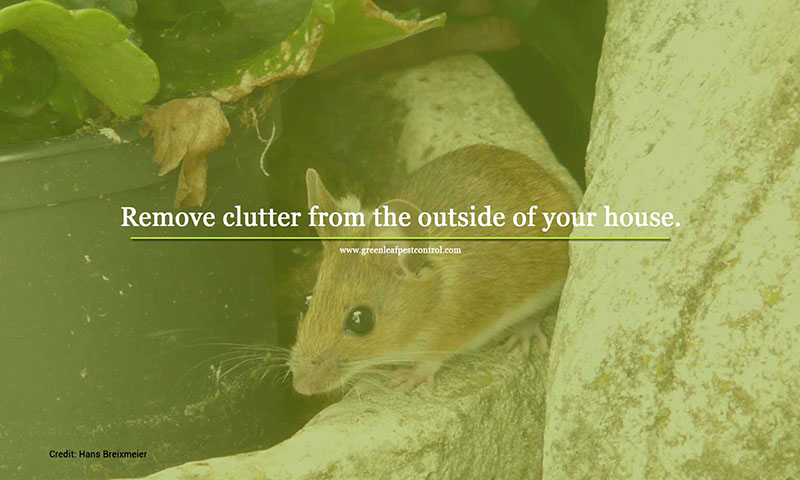
Hire a Professional Exterminator
There are plenty of things you can do yourself to prevent mice infestations this winter. What’s the number one tip that will solve your rodent problem? Hire a professional mouse extermination service. Companies that specialize in mouse invasions know how to expertly assess your home and target the problems. If you’re already seeing signs of mice in your house, it can be difficult to halt their spread. Don’t try to handle a serious problem on your own, “DIY” approaches like traps and glue are largely ineffective.
GreenLeaf Pest Control has been successfully serving the Greater Toronto Area and surrounding region with eco-conscious and effective pest control services. We take care of preventative pest control as well as pesky infestations, such as mice invasions in Toronto. Whether your office building or house has a mouse problem, we can help. For a preventative assessment or pest removal, send a message or give us a call: (416) 998-9473.



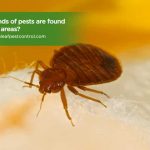
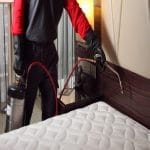
You must be logged in to post a comment.